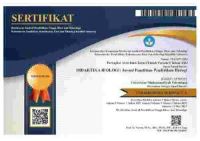PENGEMBANGAN MODUL BERBASIS BOUNDED INQUIRY LAB UNTUK MENINGKATKAN LITERASI SAINS DIMENSI KONTEN PADA MATERI SISTEM PENCERNAAN KELAS XI
Abstract
Penelitian bertujuan untuk: 1) mengetahui karakteristik; 2) menguji kelayakan dan; 3) menguji keefektifan penggunaan, pada modul berbasis bounded inquiry lab untuk meningkatkan literasi sains dimensi konten pada materi sistem pencernaan kelas XI. Penelitian dan pengembangan modul menggunakan prosedur Borg & Gall (1983) yang telah dimodifikasi. Data kemampuan literasi sains dimensi konten dianalisis dengan N-Gain ternormalisasi untuk mengetahui keefektifan modul berbasis bounded inquiry lab. Hasil penelitian dan pengembangan menunjukkan: 1) modul berbasis bounded inquiry lab untuk meningkatkan literasi sains dimensi konten pada materi sistem pencernaan dikembangkan sesuai dengan tahapan bounded inquiry lab; 2) kelayakan modul berbasis bounded inquiry lab dikategorikan sangat baik; 3) keefektifan modul yang dikembangkan dibuktikan dengan uji Wilcoxon menunjukkan ada perbedaan dalam literasi sains dimensi konten sebelum dan sesudah perlakuan dengan memiliki probabilitas (p) sebesar 0,000 (p<0,05), Ho ditolak.
This research aimed: 1) to find out the characteristics; 2) to test the feasibility and; 3) to investigate the effectiveness of module based on bounded inquiry lab to improve students’ scientific literacy of content dimension on digestive system material of grade XI. This research used procedure of research and development (R&D) by Borg & Gall (1983) that was modified. Data of students’ scientific literacy of content dimension were analyzed by using normalized N- Gain to investigate the effectiveness of module-based on bounded inquiry lab. The research results showed: 1) the module-based on bounded inquiry lab to improve students’ scientific literacy of content dimension on digestive system material was developed in accordance with the syntax of bounded inquiry lab; 2) the feasibility of module-based on bounded inquiry lab was at very good category; 3) the effectiveness of the developed module-based on bounded inquiry lab was proved by Wilcoxon test that showed the differences in students’s scientific literacy of content dimension between before and after learning by using module-based on bounded inquiry lab with probability (p) of 0.000 (p <0.05), Ho was rejected.
Keywords
Full Text:
PDFReferences
Ausubel, D.P. (1963). The Psychology of Meaningful Verbal Learning. New York: Grune & Stratton Publishers.
Borg, W.R. & Gall, M.D. (1983). Education Research: An Introduction (4th Edition). New York: Longman Inc.
Bruner, J.S. (1960). The Process of Education. New York: Vintage Book.
BSNP. (2013). Pemetaan Materi Soal Biologi (Butir Soal, Kelompok, Materi, SKL) SNP SMA Negeri 7 Surakarta (Lampiran 3). Surakarta.
Chamany, K., Allen, D., & Tanner, K. (2006). Making Biology Learning Relevant to Students: Integrating People, History, and Context into College Biology Teaching, CBE Life Sciences Education 7: 267–278.
Gucluer, E., & Kesercioglu, T. (2012). The Effect of Using Activities Improving Scientific Literacy on Students’ Achievement in Science and Technology Lesson. International Online Journal of Primary Education, I (1).
Hake, R.R. (1998). Interactive-Engagement Versus Traditional Methods: A Six-Thousand-Student Survey of Mechanics Test Data for Introductory Phsyics Course. American Journal of Physics, 66 (1), 64-74. Diakses dari http://dx.doi.org/10.1119/1.18809 pada tanggal 4 September 2014.
Iswari, Y.D. (2010). Kegiatan Laboratorium Berbasis Pemecahan Masalah Pada Materi Pokok Kelarutan dan Hasil Kali Kelarutan Untuk Meningkatkan Literasi Sains Siswa. Tesis Tidak Dipublikasikan. Jurusan Pendidikan IPA Konsentrasi Kimia SPS UPI Bandung.
Johnson, D., Levy, F., Karsai, I., & Stroud, K. (2006). Turning the Potential Liability of Large Enrollment Laboratory Science Courses Into an Asset. Journal of College Science Teaching, 35 (6), 46-51. Diakses dari http://www.jstor.org/stable/42991858
Lederman, N.G., Lederman, J.S., & Antink, A. (2013). Nature of Science and Scientific Inquiry as Contexts for the Learning of Science and Achievement of Scientific Literacy. International Journal of Education in Mathematics, Science and Technology, 1 (3), 138-147.
Liliasari. (2011). Membangun Masyarakat Melek Sains Berkarakter Bangsa Melalui Pembelajaran. Makalah Seminar Nasional ke-2 Prodi Pendidikan IPA FMIPA UNNES (sebagai Narasumber Utama), 16 April 2011. Semarang: Universitas Negeri Semarang (UNNES). Diakses dari http://liliasari.staf.upi.edu/files/2011/05/Makalah-Semnas-UNNES-2011.Liliasari.pdf pada tanggal 5 September 2014.
Liliawati, W., Purwanto, Ramlan. T., Hidayat, R., Megawati, E., & Puspitasari, F.T. (2014). Analisis Kemampuan Inquiry Siswa SMP, SMA dan SMK Dalam Penerapan Levels of Inquiry Pada Pembelajaran Fisika. Berkala Fisika Indonesia, 6 (2): 34-39.
Mulyasa, E. (2006). Kurikulum Berbasis Kompetensi, Konsep, Karakteristik, dan Implementasi dan Inovasi. Bandung: Remaja Rosdakarya.
National Science Teachers Association (NSTA). (2011). NSTA Position Statement: Quality Science Education and 21st-Century Skills. Diakses dari http://www.nsta.org/about/positions/21stcentury.aspx pada tanggal 4 September 2014.
OECD. (2007). PISA 2006: Science Competencies for Tomorrow’s World Volume 1-analysis. OECD. Diakses dari www.oei.es/historico/evaluacioneducativa/InformePISA2006-FINALingles.pdf pada tanggal 5 September 2014.
OECD. (2014). PISA 2012 Results in Focus: What 15-year-olds know and what they can do with what they know. Diakses dari https://www.oecd.org/pisa/keyfindings/pisa-2012-results-overview.pdf pada tanggal 4 September 2014.
Prastowo. (2012). Panduan Kreatif Membuat Bahan Ajar Inovatif. Yogyakarta: Diva Press.
Purwanto, Liliawati, W., & Hidayat, R. (2013). Analisis Kemampuan Inkuiri dan Hasil Belajar Siswa Sekolah Menengah Pertama melalui Model Pembelajaran berbasis Model Hierarki Of Inquiry. Prosiding Pertemuan Ilmiah XXVII HFI Jateng & DIY yang Diselenggarakan Oleh UNS, 23 Maret 2013. Solo: Universitas Sebelas Maret (UNS).
Siregar, E. & Nara, H. (2010). Teori Belajar dan Pembelajaran. Bogor: Ghalia Indonesia.
Suprijono, A. (2010). Cooperative Learning: Teori dan Aplikasi Paikem. Yogyakarta: Pustaka Pelajar.
Susanti, W. (2012). Analisis Profil Soal-soal Literasi Sains Kategori Sulit pada Tes PISA. Skripsi, tidak diterbitkan. FPMIPA Universitas Pendidikan Indonesia.
Suyanti, R.D. (2010). Strategi Pembelajaran Kimia. Yogyakarta: Graha Ilmu.
Toharudin, U., Hendrawati, S. & Rustaman, A. (2011). Membangun Literasi Sains. Bandung: Humaniora.
Wenning, C.J. (2005). Implementing Inquiry-Based Instruction in The Science Classroom: A New Model For Solving The Improvement of Practice Problem. Journal of Physics Teacher Education Online, 2 (4), 9-15. Diakses dari http://www2.phy.ilstu.edu/pte/353content/inquity_implementation.pdf
Wenning, C.J. (2010). Levels of Inquiry: Using Inquiry Spectrum Learning Sequences to Teach Science. Journal of Physics Teacher Education Online, 5 (4), 11-20. Diakses dari http://www2.phy.ilstu.edu/pte/publications/learning_sequences.pdf pada tanggal 6 September 2014.
Wenning, C.J. (2011). The Levels of Inquiry Model of Science Teaching. Journal of Physics Teacher Education Online, 6 (2), 9-16. Diakses dari http://www2.phy.ilstu.edu/pte/publications/LOI-model-of-science-teaching.pdf pada tanggal 6 September 2014.
Wenno, I. H. (2008). Strategi Belajar Mengajar Sains Berbasis Kontekstual. Yogyakarta: Inti Media.
Yusuf, S. (2008). Literasi Membaca Siswa Indonesia. Makalah disampaikan pada Seminar Nasional Hasil-hasil Studi Internasional di Departemen Pendidikan Nasional, 7 September 2006. Jakarta: Departemen Pendidikan Nasional (Depdiknas). Diakses dari http://suhendrayusuf.blogspot.co.id/2008/02/literasi-membaca-siswa-indonesia.html pada tanggal 6 September 2014.
DOI: https://doi.org/10.32502/dikbio.v1i1.959
Copyright (c) 2018 Didaktika Biologi: Jurnal Penelitian Pendidikan Biologi
Didaktika Biologi: Jurnal Penelitian Pendidikan Biologi is indexed by:

Didaktika Biologi: Jurnal Penelitian Pendidikan Biologi is licensed under a Creative Commons Attribution-ShareAlike 4.0 International License.







